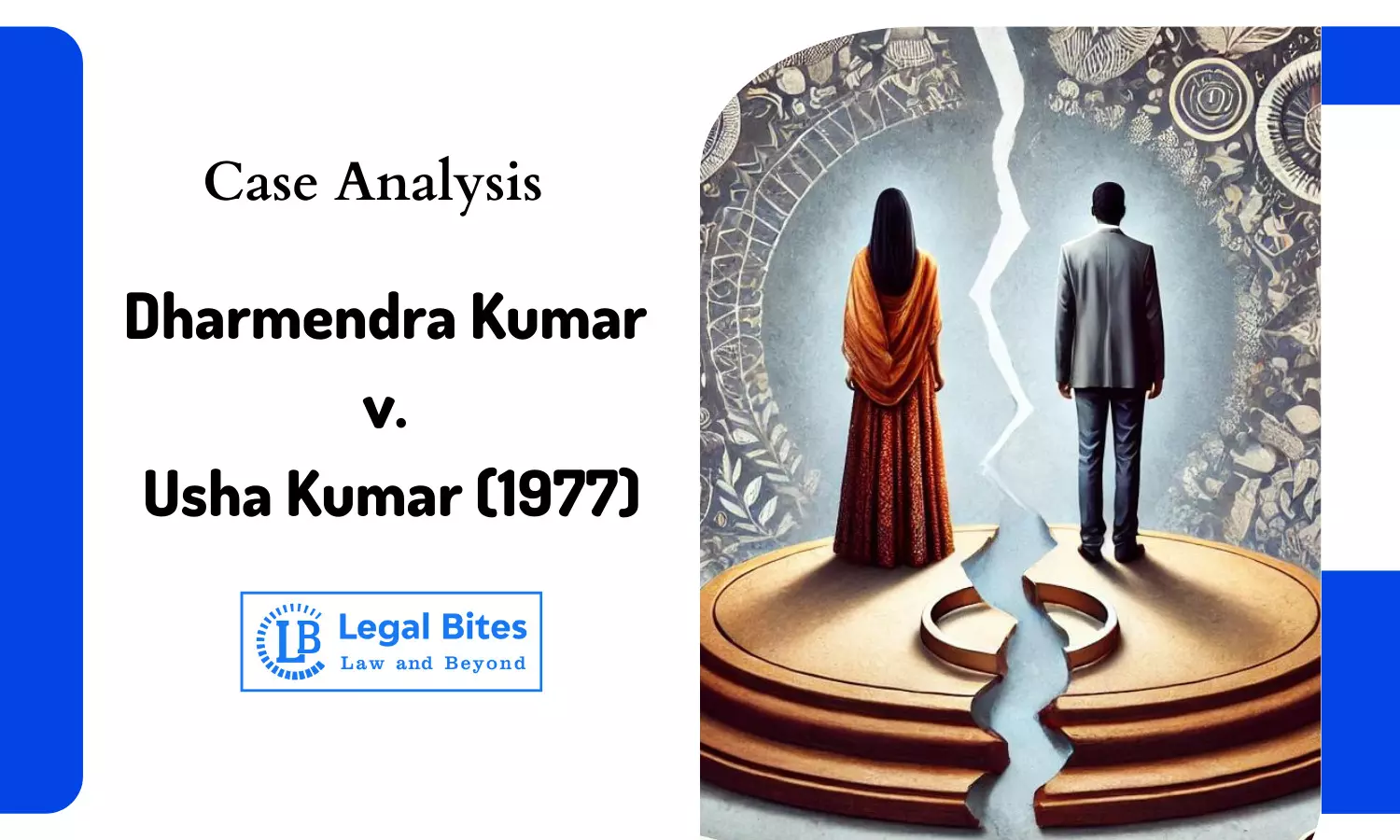Case Analysis: Dharmendra Kumar v. Usha Kumar (1977) | Non-Compliance with the Restitution of Conjugal Rights
The Supreme Court judgment in this case clarifies that non-compliance with a decree for restitution of conjugal rights does not serve as a barrier to divorce

This case concerns the dissolution of the marriage between Dharmendra Kumar and Usha Kumar, focusing on the enforcement of the restitution of conjugal rights and the subsequent petition for divorce under Section 13(1A)(ii) of the Hindu Marriage Act, 1955. The respondent-wife, Usha Kumar, was granted a decree for restitution of conjugal rights in 1973, and after no reconciliation between the parties, she filed for a divorce in 1975, citing the lack of restitution.Case Title: Dharmendra Kumar...
This case concerns the dissolution of the marriage between Dharmendra Kumar and Usha Kumar, focusing on the enforcement of the restitution of conjugal rights and the subsequent petition for divorce under Section 13(1A)(ii) of the Hindu Marriage Act, 1955. The respondent-wife, Usha Kumar, was granted a decree for restitution of conjugal rights in 1973, and after no reconciliation between the parties, she filed for a divorce in 1975, citing the lack of restitution.
Case Title: Dharmendra Kumar v. Usha Kumar
Court: Supreme Court of India
Citation: 1977 AIR 2218
Judges: Gupta (J), A.C. Fazalali (J), Syed Murtaza(J)
Date of Judgment:19/08/1977
Facts of the Case
On August 27, 1973, the respondent-wife, Usha Kumar, was granted a decree for restitution of conjugal rights under Section 9 of the Hindu Marriage Act, 1955 by the Additional Senior Sub-Judge, Delhi. This decree allowed the couple an opportunity to resume marital relations.
Despite the decree, there was no restitution of conjugal rights between Dharmendra Kumar and Usha Kumar. Usha Kumar filed a divorce petition on October 28, 1975, under Section 13(1A)(ii) of the Hindu Marriage Act, 1955, stating that there had been no resumption of marital relations after the decree.
Dharmendra Kumar, in his written statement, admitted that there had been no restitution but argued that he made several efforts to comply with the decree. He claimed to have sent multiple registered letters to Usha Kumar, inviting her to live with him, to which he received no response.
Dharmendra Kumar contended that Usha Kumar was taking advantage of her own wrong, as it was she who failed to comply with the decree by refusing his offers for reconciliation.
Issues Raised
- Whether the respondent-wife is entitled to file for divorce under Section 13(1A)(ii) of the Hindu Marriage Act, 1955, for lack of restitution of conjugal rights?
Whether the appellant-husband's efforts to restore the marital relationship negated the claim for divorce by the respondent?
Whether Usha Kumar was taking advantage of her own wrong by failing to comply with the restitution decree?
Legal Provisions Involved
- Section 9 of the Hindu Marriage Act, 1955: Deals with the restitution of conjugal rights, where the court can pass a decree to restore marital relations between estranged spouses.
Section 13(1A)(ii) of the Hindu Marriage Act, 1955: Allows either party to file for divorce if there has been no restitution of conjugal rights between them for one year or more after the passing of a decree for restitution.
Section 23(1)(a) of the Hindu Marriage Act, 1955: States that relief can be denied if the petitioner is found to be taking advantage of their own wrong or disability.
Judgment
The Supreme Court of India ruled in favour of Usha Kumar, affirming the judgment of the Delhi High Court.
- Entitlement to Divorce: The court observed that Section 13(1A)(ii) of the Hindu Marriage Act, 1955 provides that either party can file for divorce if there is no restitution of conjugal rights for one year after the decree. In this case, since there had been no restitution for over two years, Usha Kumar was within her rights to file for divorce.
Husband's Efforts: The court rejected Dharmendra Kumar's claim that he made sufficient efforts to restore the marital relationship. The mere sending of registered letters inviting the respondent to resume cohabitation was not deemed adequate to fulfil the decree's requirement for restitution of conjugal rights.
No Advantage of Own Wrong: The court held that Usha Kumar was not taking advantage of her own wrong. The evidence did not support the claim that she deliberately prevented the restitution of conjugal rights. The absence of restitution was not caused by any wrongful act on her part. The court clarified that mere non-compliance with the decree for restitution does not constitute a "wrong" under Section 23(1)(a) of the Act, as it requires something more than a refusal to agree to reconciliation.
The case is significant as it clarifies the application of Section 13(1A)(ii), which allows either spouse to seek divorce after one year of non-compliance with a restitution decree, without the need to prove fault. The court reinforced that failure to reconcile is not, in itself, a "wrong" that would prevent a decree for divorce.
Conclusion
Dharmendra Kumar v. Usha Kumar case highlights the legal grounds for divorce under the Hindu Marriage Act, 1955, specifically in cases where there is no restitution of conjugal rights. The judgment reaffirms that a party seeking divorce after the passing of a restitution decree does not need to prove fault or wrongdoing by the other party, and mere non-compliance with the decree is sufficient grounds for divorce under Section 13(1A)(ii).
This case also serves as a reference for the scope of Section 23(1)(a) of the Act, emphasizing that non-compliance with a restitution decree alone does not constitute a wrong that would bar relief to the petitioner. The decision underscores the importance of ensuring that the legal process of restitution or reconciliation is genuinely attempted before filing for divorce.
Important Links
Law Library: Notes and Study Material for LLB, LLM, Judiciary, and Entrance Exams

Apurva Neel
I am a Research Associate and Editor at Legal Bites with an LL.M. specialization in Corporate and Commercial Laws from Amity University, Mumbai. I have put my best efforts into presenting socio-legal aspects of society through various seminars, conferences etc. I keep refining content as I am an ardent writer, and palpably law has got multi-dimensional aspect, so I passionately try to explore ahead.
